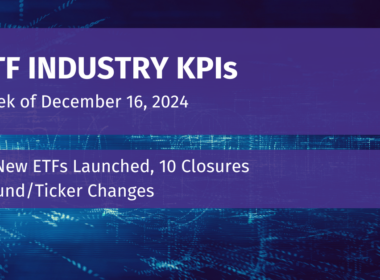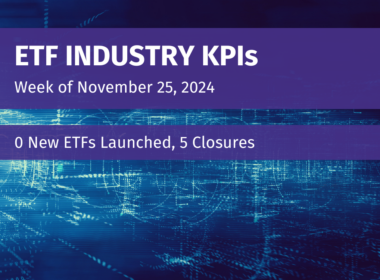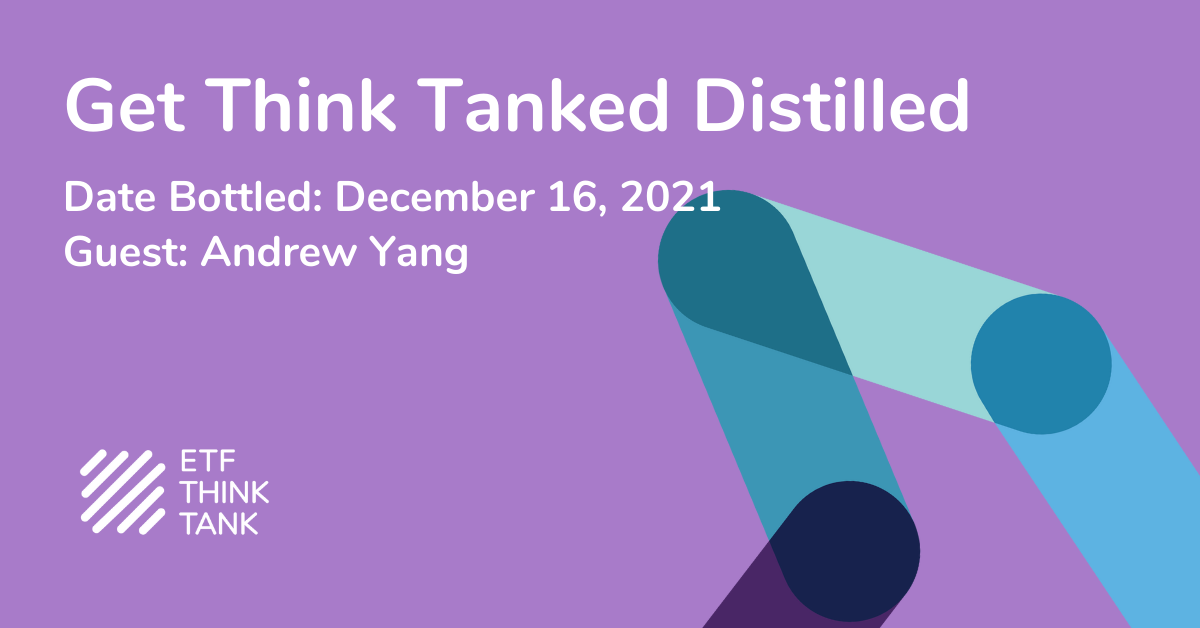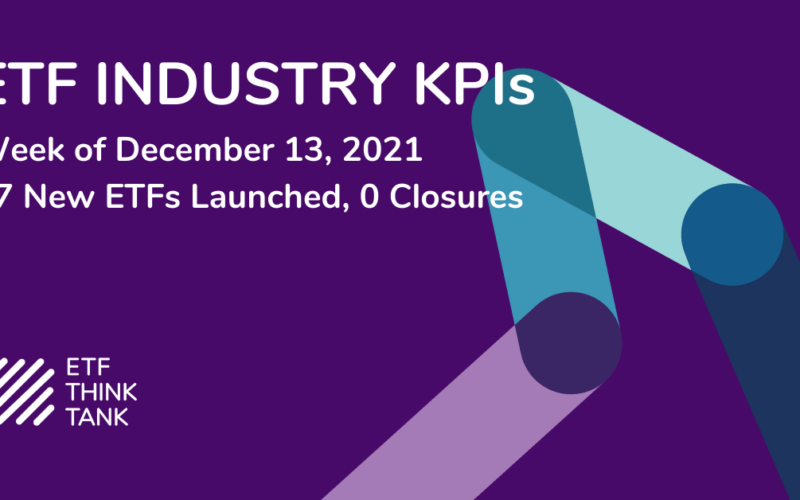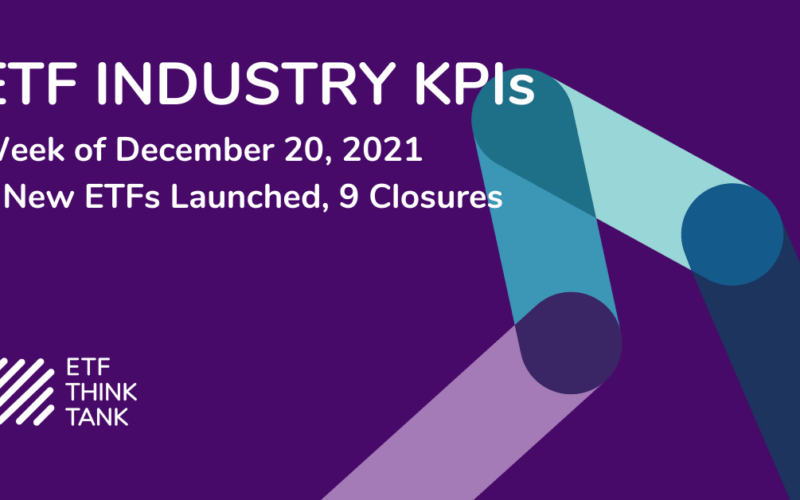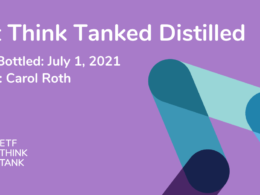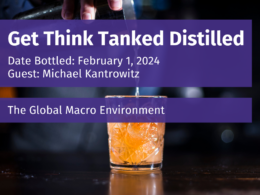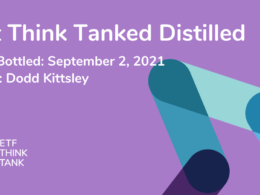2020 Presidential candidate Andrew Yang has been on a crusade to change the way things work in Washington. His proposal of a “universal basic income” spurred conversations about how we develop social welfare programs in our country, although it was incredibly polarizing. Yang was kind enough to join the ETF Think Tank to talk economic policy, financial regulation and, of course, cryptocurrency.
To set the table, Yang discussed why he decided to leave the Democratic Party. He feels that our political system is actually designed to work and rewards people who take more extreme views. Since 94% of incumbents end up getting re-elected, there is actually a disincentive to reach across the aisle and the system rewards dysfunction. Yang developed the Forward Party as a way to create a common cause with more independent-minded individuals, move away from more extreme political views, and avoid political overreach.
Another problem Yang sees is one that’s also an issue in the financial world – confirmation bias. It’s more comfortable to associate with people and ideas that are most similar to our own, so you end up dividing people into ideological tribes. Media companies today have the goal of maximizing engagement, so the algorithms used are all about accomplishing that. That means encouraging confirmation bias and avoiding any challenging information. We’re in a time today where we’re unsure of what to believe and that makes it difficult for representative democracy to function.
The universal basic income is the idea Yang is most associated with, but he acknowledges that it can create an aggressive response from people. There’s a risk that if a UBI is established, elections could be decided simply by who is willing to promise more. Yang says that more than half of Americans are already receiving some form of government assistance, in many cases disability or unemployment. These are often done in inefficient ways and can create negative incentives attached to them. A universal basic income, he feels, can help with value creation instead of creating an incentive for individuals to stay out of the labor force.
Yang is also interested in ways that defi, blockchain and cryptocurrency can enhance the possibilities in finance. He feels that regulation in many areas is appropriate, and no regulation is not a realistic point. Within cryptocurrency, however, he doesn’t think regulation is the way to go. Many people focus on the compliance issues within crypto, but not enough focus on the innovation aspect of it. Crypto has the potential to be one of the most dramatic and significant developments in value creation in the history of the world. The Forward Party wants to make innovation a priority and wants to lobby for crypto and blockchain as anti-poverty.
One possible solution is establishing a separate regulator for cryptocurrency apart from the SEC. In the current environment, if you’re an official at the SEC or the Treasury Department, your natural instinct might be to shut down discussions about crypto because you’re thinking about risk, not innovation. How can the government manage that impulse so it’s not actually inhibiting progress? A separate regulator could be allowed to focus on the innovation aspect of crypto.
Other key takeaways:
- Yang is very bullish on artificial intelligence, but also concerned about the social impact. He thinks that this technology is going to change most industries and those companies that are able to utilize its potential and hold the data will have the competitive advantages. There are many practical applications for AI.
- The way the Fed is putting money into the system isn’t helping solve the wealth gap issue. 83% of the current money is going to the affluent and institutional folks. You need to put it into the hands of people who 1) need it and 2) will spend it.
- We’ve overleveraged the entire system and may be in a debt trap. We’ve ended up with a system flooded with cheap liquidity and that’s created asset bubbles. Yang believes we’re headed down a very rough road ahead.
Disclosure
All investments involve risk, including possible loss of principal.
The information provided here is for financial professionals only and should not be considered an individualized recommendation or personalized investment advice. The investment strategies mentioned here may not be suitable for everyone. Each investor needs to review an investment strategy for his or her own particular situation before making any investment decision.
All expressions of opinion are subject to change without notice in reaction to shifting market conditions. Data contained herein from third party providers is obtained from what are considered reliable sources. However, its accuracy, completeness or reliability cannot be guaranteed.
Examples provided are for illustrative purposes only and not intended to be reflective of results you can expect to achieve.
The value of investments and the income from them can go down as well as up and investors may not get back the amounts originally invested, and can be affected by changes in interest rates, in exchange rates, general market conditions, political, social and economic developments and other variable factors. Investment involves risks including but not limited to, possible delays in payments and loss of income or capital. Neither Toroso nor any of its affiliates guarantees any rate of return or the return of capital invested. This commentary material is available for informational purposes only and nothing herein constitutes an offer to sell or a solicitation of an offer to buy any security and nothing herein should be construed as such. All investment strategies and investments involve risk of loss, including the possible loss of all amounts invested, and nothing herein should be construed as a guarantee of any specific outcome or profit. While we have gathered the information presented herein from sources that we believe to be reliable, we cannot guarantee the accuracy or completeness of the information presented and the information presented should not be relied upon as such. Any opinions expressed herein are our opinions and are current only as of the date of distribution, and are subject to change without notice. We disclaim any obligation to provide revised opinions in the event of changed circumstances.
The information in this material is confidential and proprietary and may not be used other than by the intended user. Neither Toroso or its affiliates or any of their officers or employees of Toroso accepts any liability whatsoever for any loss arising from any use of this material or its contents. This material may not be reproduced, distributed or published without prior written permission from Toroso. Distribution of this material may be restricted in certain jurisdictions. Any persons coming into possession of this material should seek advice for details of and observe such restrictions (if any).


